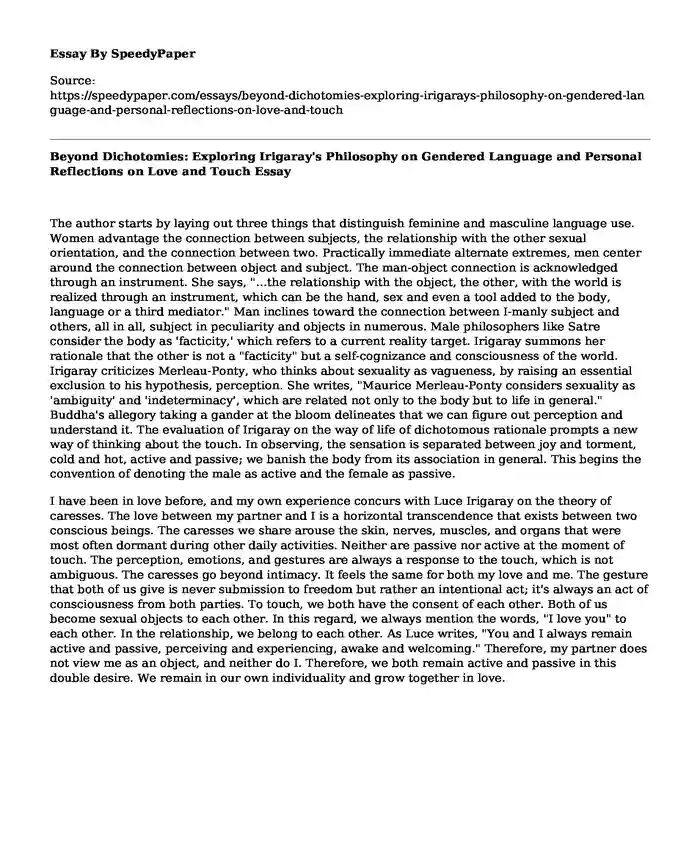
| Type of paper: | Essay |
| Categories: | Philosophy Human sexuality |
| Pages: | 2 |
| Wordcount: | 484 words |
The author starts by laying out three things that distinguish feminine and masculine language use. Women advantage the connection between subjects, the relationship with the other sexual orientation, and the connection between two. Practically immediate alternate extremes, men center around the connection between object and subject. The man-object connection is acknowledged through an instrument. She says, "…the relationship with the object, the other, with the world is realized through an instrument, which can be the hand, sex and even a tool added to the body, language or a third mediator." Man inclines toward the connection between I-manly subject and others, all in all, subject in peculiarity and objects in numerous. Male philosophers like Satre consider the body as 'facticity,' which refers to a current reality target. Irigaray summons her rationale that the other is not a "facticity" but a self-cognizance and consciousness of the world. Irigaray criticizes Merleau-Ponty, who thinks about sexuality as vagueness, by raising an essential exclusion to his hypothesis, perception. She writes, "Maurice Merleau-Ponty considers sexuality as 'ambiguity' and 'indeterminacy', which are related not only to the body but to life in general." Buddha's allegory taking a gander at the bloom delineates that we can figure out perception and understand it. The evaluation of Irigaray on the way of life of dichotomous rationale prompts a new way of thinking about the touch. In observing, the sensation is separated between joy and torment, cold and hot, active and passive; we banish the body from its association in general. This begins the convention of denoting the male as active and the female as passive.
I have been in love before, and my own experience concurs with Luce Irigaray on the theory of caresses. The love between my partner and I is a horizontal transcendence that exists between two conscious beings. The caresses we share arouse the skin, nerves, muscles, and organs that were most often dormant during other daily activities. Neither are passive nor active at the moment of touch. The perception, emotions, and gestures are always a response to the touch, which is not ambiguous. The caresses go beyond intimacy. It feels the same for both my love and me. The gesture that both of us give is never submission to freedom but rather an intentional act; it's always an act of consciousness from both parties. To touch, we both have the consent of each other. Both of us become sexual objects to each other. In this regard, we always mention the words, "I love you" to each other. In the relationship, we belong to each other. As Luce writes, "You and I always remain active and passive, perceiving and experiencing, awake and welcoming." Therefore, my partner does not view me as an object, and neither do I. Therefore, we both remain active and passive in this double desire. We remain in our own individuality and grow together in love.
Cite this page
Beyond Dichotomies: Exploring Irigaray's Philosophy on Gendered Language and Personal Reflections on Love and Touch. (2024, Jan 20). Retrieved from https://speedypaper.com/essays/beyond-dichotomies-exploring-irigarays-philosophy-on-gendered-language-and-personal-reflections-on-love-and-touch
Request Removal
If you are the original author of this essay and no longer wish to have it published on the SpeedyPaper website, please click below to request its removal:
- Paper Example on How Do the Films Disrupt the Male Gaze?
- Essay Sample: The Interview With a Non-American
- Essay Example: Decriminalizing or Legalizing Sex Work
- Essay Sample on Climate Change and Effects on Cities
- Free Essay on Feminism Separatism
- Essay Sample on Pro-life vs. Abortion
- Free Essay Sample on The "Super Size Me" Documentary
Popular categories




